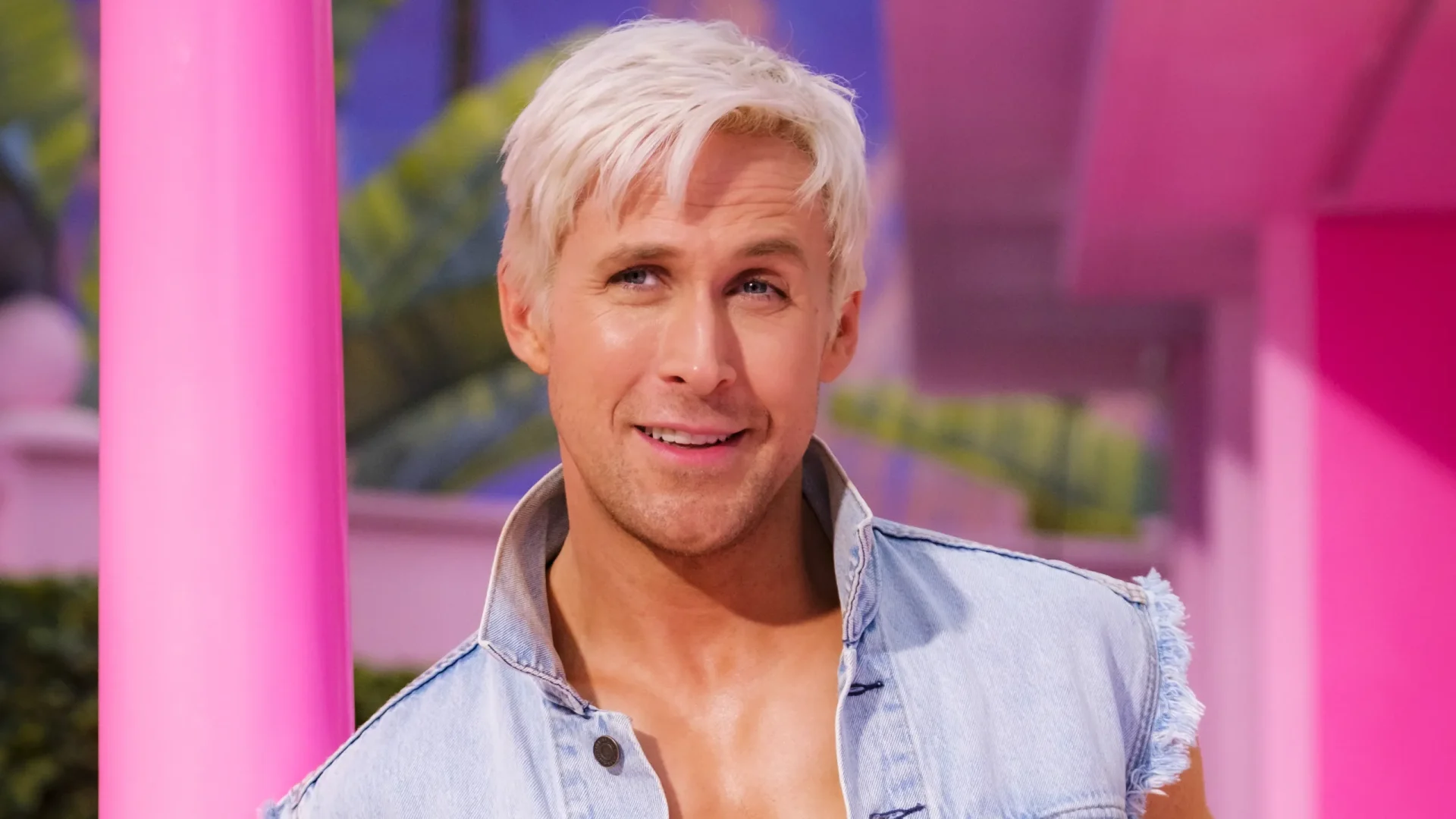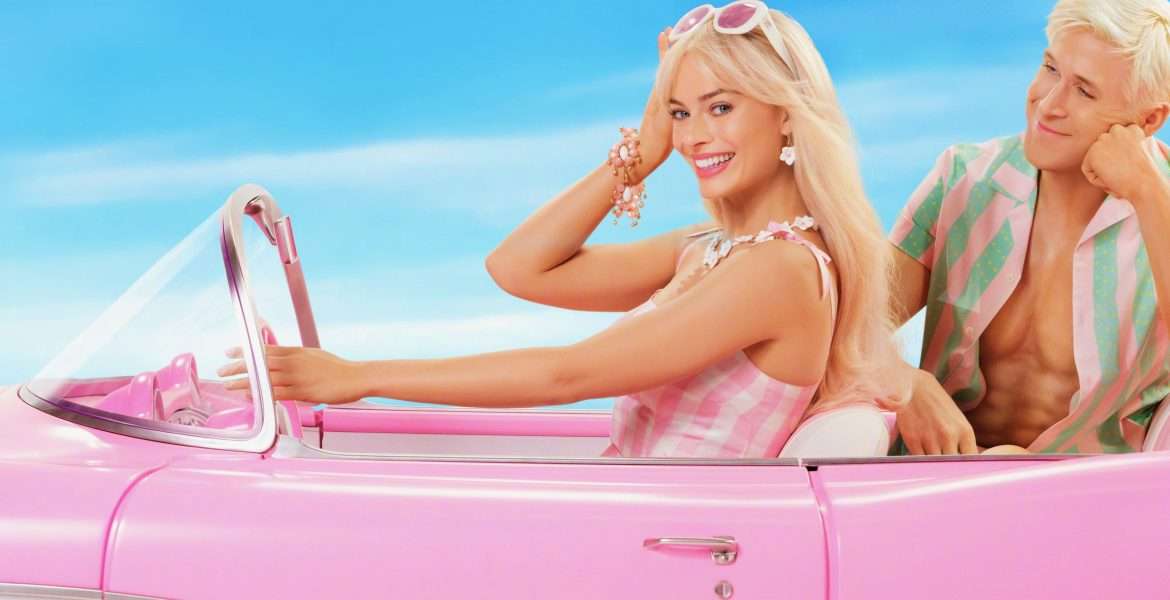This piece was written during the 2023 WGA and SAG-AFTRA strikes. Without the labor of the writers and actors currently on strike, the movie being covered here wouldn’t exist.
Barbie (2023) Movie Review: Greta Gerwig and Noah Baumbach are credible filmmakers who know what they’re doing. It feels apt to start a review of Barbie with that line because it seems to be the aspect of its release that isn’t getting enough coverage. Because Barbie the brand is so tremendously popular, it feels as if audiences are entering the Barbenheimer box office battle with a preconceived idea of what its film adaptation might amount to. Except it’s so much more than just another Barbie movie. It’s thoughtful, nuanced, relatable, and everything else we should expect from Gerwig and Baumbach.
Gerwig first collaborated with Baumbach on Frances Ha in 2012. The pair co-wrote the screenplay, with the latter directing and the former starring as the titular Frances. In a way, it couldn’t distance itself further away from Barbie. Frances Ha is shot entirely in New York in black and white, whereas Barbie lives mostly in bright-pink authentic-but-artificial soundstage designs. The cast of Frances Ha is only a few names long, whereas Barbie’s comes closer to the 11-mile length of Oppenheimer’s 70mm IMAX reel. Even in terms of budget, there’s a $142 million difference between them—no prizes for guessing which was the most expensive.
But actually, despite all of the differences between Frances Ha and Barbie, they do share a
fundamental core beneath it all. They’re both stories about women who struggle to just be
human beings in today’s world.
Barbie starts off in a fairly typical storybook fashion. Helen Mirren’s voice is the first we hear as The Narrator, guiding us through a short history of dolls, while 2001: A Space Odyssey is parodied, starring little girls with baby dolls. At the time, it seems so light-hearted, humorous, and even a little throwaway, but it’s anything but on reflection.
Our expectations are played upon and played into as The Narrator talks about how it’s only fun to play a mother for a certain amount of time and that that’s why little girls need more than just babies to play with. It’s so easy to take that at face value as an act of solidarity with the parents in the audience, and in a lesser film, that’s all it would have been. In this case, it sets one of the themes of the whole film in motion before we’ve even set foot in the utopian Barbieland.
That’s because it isn’t looking to appease the parents in the audience, but rather its audience is partly parents. Barbie isn’t trying to be a film for kids in any way whatsoever; it’s trying to be one that anyone who’s ever interacted with Barbie can relate to. That means, basically, it’s something for all of us.
When we first get to Barbieland, there’s a wonderful party atmosphere. Everything is perfect, everyone is happy, and every day is the best day ever. Things go awry, however, when Barbie (Margot Robbie) hosts a party at her Malibu Dreamhouse for the other Barbies (Issa Rae, Hari Nef, Alexandra Shipp, Emma Mackey, and others) and the Kens (Ryan Gosling, Kingsley Ben-Adir, Simu Liu, etc.).
During an excellently choreographed dance number to Dua Lipa’s Dance the Night, Barbie asks the other Barbies whether they ever think about death. They’re all so shocked and appalled by the question that Barbie immediately represses whatever feeling made her ask, and everything returns to normal. Until the next morning, when her characteristically tip-toed feet have turned flat, everything in her usually perfect morning routine feels slightly off.

She shares the news of her flat feet with the other Barbies, and they advise visiting a Weird Barbie (Kate McKinnon) who was played with too hard. Having nearly been destroyed, Weird Barbie now dedicates her life to restoring the other Barbies to their most-perfect selves whenever something goes wrong. Weird Barbie says that the reason for Barbie’s strange feelings of late is that the girl who’s playing with her in the real world is feeling those feelings herself. Barbie has ceased to make her happy anymore, so she has to travel to the real world to make it right. Ryan Gosling’s Ken, with nothing better to do without his Barbie, sneaks out to the real world with her.
Both Barbie and Ken have high hopes for the world they’re about to see, under the impression that Barbie has empowered women to rule in the same way they do in Barbieland. It doesn’t take long for them to realize that things aren’t quite like what they believed.
In the real world is where Barbie becomes such an emotionally rich film. In learning about
imperfections, the difficulty of everyday life, and the general mundanity of living, Barbie herself is able to find beauty in it all. She’s objectified by men and seen as a fascist by little girls, but by experiencing real interactions with real humans, she finds a value in herself that goes beyond just whether everybody loves her or not.
Although Barbieland was a safe space where everyone was happy, she finds something so meaningful in feeling real emotions for good reasons. From this point on, Barbie is as much of a warm hug to tell us it’s okay to feel sad as it is a reminder that just being a human requires incredible strength, especially for a woman in a world where men dominate.
It’s a completely different experience for Ken, though, as he finds that his gender alone is finally enough for him to command respect. He begins to learn about and treat the idea of the patriarchy almost as a religion because of it. He sets off on a pilgrimage back to Barbieland to spread the gospel of men and horses before Barbie’s even ready to head home. The results are often funny, and Barbie isn’t at all afraid to poke fun at the idea of masculinity for the sake of masculinity, but that doesn’t get in the way of how pertinent the message underpinning it all is.
Although Barbie and Ken are such central figures to the identity of this film and the messages behind it, it would be unjust to conclude this review without mentioning the character of Gloria, played by America Ferrera. She’s a Mattel employee who works there because she grew up loving Barbie. She had her own Weird Barbie that she played with too hard, and the brand is something she later bonded with her daughter over.
But her daughter’s growing up, and now she’s returning to playing with Barbie with more sadness than joy later in life. Barbie is as much about her as it is about Barbie or Ken because it’s through Gloria that we’re able to see just how difficult life is for a real human like her, what Barbie can mean on a sentimental level, and why we just need to be sad sometimes to make things better.
Barbie is a film that explicitly trusts us to see it with our inner child’s imagination. Barbieland is a real place just because it can be, and Barbie is an autonomous being just because she can be. There aren’t any convoluted rules about how or why. Instead, we’re just asked to go with it. When we do, we’re rewarded with a rich allegory for life as we know it through the lens of a doll that we all grew up with in one way or another.


